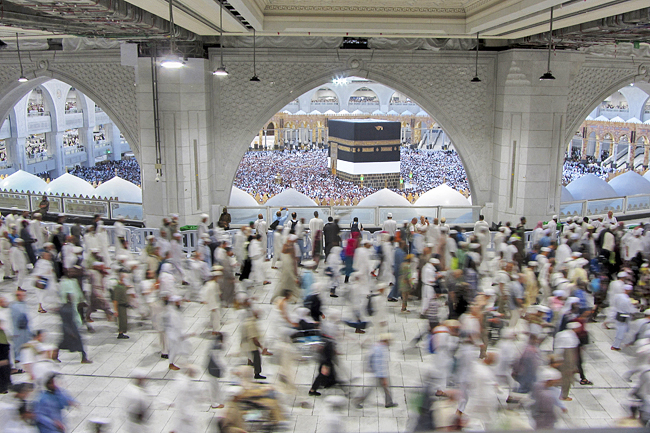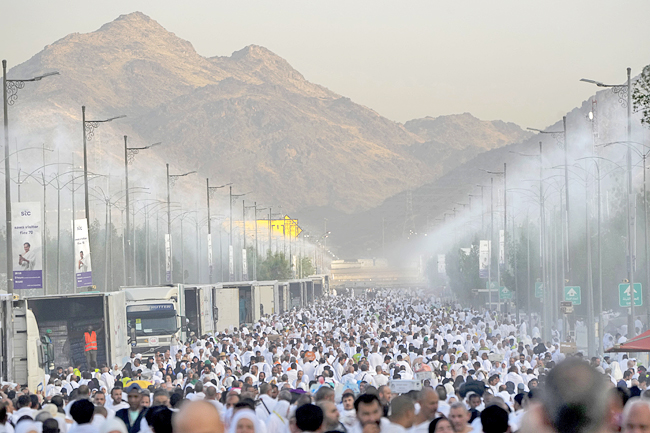Over two million Muslims have gathered in Makkah this year to perform the annual haj pilgrimage, marking the largest religious gathering globally. Among them are around 1,000 haj pilgrims from Brunei.
The haj is one of the five pillars of Islam and is considered a mandatory pilgrimage for all Muslims, with the means to be undertaken at least once in their lifetime.
As the haj pilgrimage returns to pre-pandemic levels, pilgrims donning white robes or ihram converged in Mount Arafah, reaching its pinnacle on Tuesday. Despite the scorching heat in Makkah, testing the endurance of the worshippers, pilgrims gather in Mount Arafah. Here, Prophet Muhammad (pbuh) delivered his final sermon.
Those who are not pilgrims are recommended to fast on this day, as it is a sunnah of the Prophet (pbuh). The Prophet (pbuh) mentioned that fasting on the day of Arafah expiates the sins of the past and the coming year.
Before their departure to Makkah, Bruneian haj pilgrims spent time in Madinah, where they performed prayers at the Nabawi Mosque, considered the second holiest mosque in Islam after the Great Mosque (Masjidil Haram) in Makkah. They also visited the resting place of Prophet Muhammad (pbuh) inside the Nabawi Mosque, the Raudhah (the garden of Paradise), and historical sites in Madinah.


Bruneian pilgrims are advised to stay hydrated, minimise sun exposure, and care for their health, especially those with pre-existing illnesses. Health authorities emphasise the importance of drinking enough water to avoid dehydration and maintaining personal hygiene, including hand-washing before and after meals.
The haj rituals include Tawaf (circling the Kaabah seven times at Masjidil Haram), Sa’ie (going back and forth between Safa and Marwah hills), and stoning the devil at three Jamrah (pillars) in Mina by throwing pebbles at the walls representing the devil. Pilgrims also pass by Mudzalifah, where pebbles for stoning devils are collected.
However, Bruneian pilgrims receive pebbles in advance from their haj travel agencies. Finally, haj pilgrims will perform Tahalul (cutting or trimming hair).
The haj journey concludes with Aidiladha, also known as the Feast of Sacrifice.
The celebration was marked yesterday in Saudi Arabia and today in Brunei. Animals are sacrificed throughout the country within the three days of Tasyrik.
Before returning to their homelands, haj pilgrims will perform the farewell Tawaf or Tawaf Wida’. Brunei pilgrims will return in early July through four flights.
This year, the age restriction for pilgrims, previously set at under 65 years, has been removed, allowing thousands of elderly to participate.
During the COVID-19 pandemic, the number of haj pilgrims was limited. It was only last year that the annual pilgrimage was reinstated, with around 450 Bruneian pilgrims performing the rituals. Those aged 65 and above were not allowed to participate last year.
Muslims are encouraged to make the most of the 10 days of Zulhijjah, drawing closer to Allah the Almighty by giving charity, fasting on the day of Arafah (for non-pilgrims), reciting Takbir (praising Allah the Almighty), and Al-Quran recitation.
Pilgrims are urged to fully embrace the opportunity to be in the Holy Land and to perform their acts of worship with sincerity, and refraining from committing sinful acts. A pilgrim’s journey is distinct from a casual traveller’s, as every intention, movement, and expenditure carries immense blessings. When done sincerely in the name of Allah the Almighty, the reward is known as Mabrur haj (perfect haj). – Azlan Othman






